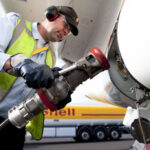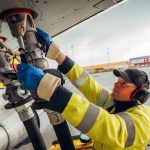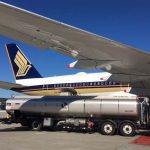Sustainability standards body RSB has entered a strategic collaboration with Air bp to launch a pilot book and claim system that allows the jet fuel supplier’s customers to purchase sustainable aviation fuel (SAF) without a physical connection with the supply site. Book and claim is particularly relevant to the general and business aviation market where fuel volumes are smaller and typically purchased over a wide number of locations, while current SAF volumes and existing supply points remain limited. The new programme will enable Air bp to deliver SAF into the supply chain at one airport location and ‘book’ the carbon reduction associated with it into a registry. Then the customer at another location can ‘claim’ those carbon reductions by purchasing their traditional jet fuel along with the benefit of the lifecycle carbon reductions that have been registered in that registry, reports Susan van Dyk. The system can be used with jet fuel purchases in France, Germany, Spain, Switzerland, the UK and the US, subject to availability, with more locations possible in the future. According to RSB, the pilot scheme and concurrent stakeholder consultations to finalise a book and claim manual will ensure SAF transactions using the system are credible, traceable and avoid double counting. Certification will guarantee the net environmental effect is the same, no matter where SAF is purchased and used.
“Book and claim will be crucial,” said Elena Schmidt, interim Executive Director of the Roundtable on Sustainable Biomaterials (RSB), and “can help to bring the value of SAF to customers who would like to buy it or need the benefits from flying with SAF.”
A lack of availability, which is further limited to only a few locations, places SAF out of reach of many potential customers, explained Schmidt, and is a challenge to the expanded deployment of SAF. If SAF had to be physically available at every airport, additional costs would also be incurred in transportation, and associated emissions would increase. A book and claim system provides a solution to the logistical challenge of bringing SAF to market to allow customers to purchase SAF while decoupling environmental benefits from the physical product, which can be transferred separately via a dedicated registry. The principles of the system are illustrated below.

The pilot phase will run from Q3 2021 to Q1 2022 before the market launch of the certification system in Q2 2022 that will open it to wider market adoption. The first SAF transactions and pilot certificates will be issued during the pilot phase, and specifications for the post-pilot registry will be developed. In tandem, stakeholder consultations will take place and key issues will be addressed, including establishment of rules to prevent double-counting, recognition by voluntary GHG disclosure programmes such as the Science Based Targets Initiative (SBTi), dealing with data confidentiality versus public availability, and alignment with other initiatives and recognition by other programmes. Lessons learnt and stakeholder comments will be integrated into the final certification requirements for the RSB Book & Claim Manual. Key mid-point results of the project will be presented during the 2021 RSB Annual Conference in November.
Air bp will be the first fuel supplier to register and make trades using the RSB book and claim solution. David Mosley from Air bp explained at a RSB seminar held in August that the company had received multiple requests for SAF from customers all over the world. He said book and claim will widen access of SAF to customers who are not located near current SAF production and several customers had requested a book and claim system, which had prompted the collaboration with RSB. “We hope this pilot will increase the appetite for SAF in the industry,” he added.
The minimum volume of book and claim SAF that can be purchased is 5,000USG/19,000 L/ 19m3/ 15MT. As well as giving a wider range of customers access to the benefits of SAF, book and claim will help Air bp to understand SAF demand. In the meantime, Air bp will continue to develop physical SAF supply chains based on demand.
The RSB book and claim is a chain of custody model in which the administrative record flow is not connected to the physical flow of material or product throughout the supply chain. The system includes a registry that guarantees full traceability and mitigates the risk of double counting. SAF suppliers, holding a registry account, will be able to record and trade SAF volumes in the registry, which will issue retirement certificates for airlines and corporate customers.
The system will allow aircraft operators to use the physical fuel in one location while claiming the environmental benefits in a different location to reduce their emissions. Alternatively, it enables the attribution of GHG emission reductions through SAF use to corporations to reduce their Scope 3 emissions.
Integration and alignment of the RSB system with other systems such as the World Economic Forum’s Clean Skies for Tomorrow (CST) SAF Certificate (SAFc) system for corporate travellers (see article) is a goal, and exploring how the RSB system will function under the European Commission’s recently released ReFuelEU proposal, which does not currently include a book and claim system, will be clarified in the near future.
The WEF CST SAFc framework is based on the same principle of separating SAF from its sustainability characteristics but has a different focus than the RSB book and claim system. It is an accounting tool that will allow SAF emissions reductions to be claimed by the traveller if they cover the higher cost of the fuel. It works within standard book and claim processes, allowing the actual SAF to be delivered to the airport nearest its production plant.
A rigorous SAF certificate system will be an essential component of other initiatives such as the Sustainable Aviation Buyers Alliance (SABA), comprised of corporations with significant air travel and freight footprints (i.e. Scope 3 emissions) who want to achieve net zero emissions (see article).
A question arises on how these different systems will be integrated to avoid situations like double counting and whether a joint registry should be established for all these systems. According to RSB’s Schmidt, alignment between initiatives is important and will need to be addressed. RSB believes it can contribute to the development process of other initiatives such as SABA since it has the proven ability to develop robust auditing frameworks and the rulebook on book and claim systems using its multi-stakeholder platform. RSB says it can also provide information for developing a credible registry and retirement certificates while also ensuring additional environmental benefits through the use of such credits and avoiding double counting.
The pilot scheme between RSB and Air bp will provide lessons learned to feed into other initiatives, said Schmidt. However, she pointed out, the RSB book and claim and the SAFc systems have different aspirations, and the specific alignment of the systems must be clarified. There are a lot of details that still need to be figured out, she added.
Another area of uncertainty is how the RSB book and claim system will function within the EU as the proposed ReFuelEU Aviation regulation does not currently include provision for such a system. The ReFuelEU Aviation proposal, released as part of the European Commission’s ‘Fit for 55’ climate package, includes a mandate on fuel suppliers to include SAF in aviation fuel supplied at EU airports (see article). The proposed regulation indicates explicitly a book and claim system is not included at this stage, although it is not excluded as a future possibility, provided that it be governed by robust rules ensuring the environmental integrity of the system. While SAF would initially not need to be supplied at every airport, fuel suppliers must provide at least a 2% blend of SAF at every airport – a fraction of the 20% proposed mandate by this date – from 2030-2035. The balance of the mandate can be met by supplying a higher share of SAF at select airports. According to Schmidt, this indicates that some type of certificate trading is implied and that the RSB book and claim system can provide a solution.
During its August seminar, RSB also announced the establishment of the EcoTransport Programme, a sustainability certification that allows transport companies to get a credible third-party RSB certification for their sourcing of fuels that are in compliance with the strong sustainability criteria of the RSB. For example, explained Schmidt, an airline could sell a branded ‘ecofly’ ticket to customers as opposed to a regular ticket. This product would carry RSB certification and allow the use of the RSB trademark. While book and claim allows SAF certified by other sustainability schemes, the EcoTransport certification will comply with stricter sustainability criteria. It goes beyond GHG reductions to provide assurance on key customer concerns around deforestation, food security, labour rights and supply chains, backed by RSB standards. The programme will not be limited to the aviation sector but could also be used by cargo shipping, for example.
Top photo and infographic: Air bp
















More News & Features
Lessons learned from the collapse of Fulcrum BioEnergy
Early data shows uncertainty that UK SAF mandate can be met in its first year
Swiss advanced SAF technology startups Metafuels and Synhelion reach project milestones
PtX fuels have significant Asia-Pacific potential but face many barriers, finds report
Airfreight giants DHL Express and FedEx announce big US SAF deals
Asia-Pacific study reveals pessimistic outlook for SAF uptake by 2030 as Singapore details levy